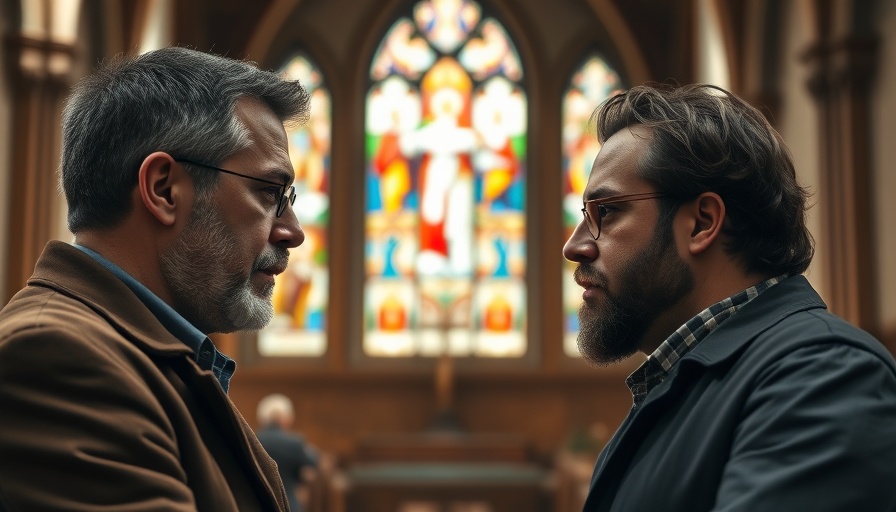
Exploring Morality: Divine Hiddenness, Goodness, and the Human Experience
The ongoing debate surrounding morality is as ancient as philosophy itself. At the juncture of faith and reason, the heartfelt conversations between believers and skeptics continue to explore profound questions: can we truly grasp morality without a divine framework? This conversation has taken on new dimensions in various public discussions, especially around the issues of divine hiddenness and the nature of good and evil.
In 'Philosopher and Preacher Go Head to Head on Morality, Evil, Consciousness and More,' the conversation dives into divine hiddenness and its implications for moral understanding, prompting us to further analyze these pressing questions.
The Quest for Moral Realism
In a recent discussion reflecting on moral principles, philosophers have grappled with concepts often perceived as a challenge to the morality of believing in a higher power. They ponder the reasons behind humanity's internal struggles with fundamental moral questions. Philosphers like JL Schellenberg have raised important points about divine hiddenness—the notion that an all-loving God would make His presence undeniably known to foster a relationship. However, existence's geographical and social disparities call into question the fairness of moral judgment based on one’s birthplace. To explore moral realism without reliance on a deity begs the question: what truly grounds morality?
Divine Hiddenness: A Challenging Dilemma
The issue of divine hiddenness reveals a deep, underlying worry among believers: Why do so many remain unaware of God's presence? The assertion that God desires relationships with all people complicates philosophical assumptions. If God is truly loving, His absence in many lives poses a significant moral dilemma. Notably, the famous poet and moralist C.S. Lewis suggests that without a higher standard of goodness, the existence of evil becomes less comprehensible. This tension raises questions about our ability to understand good without a moral point of reference. How can people differentiate between right and wrong if every belief rests solely on subjective definitions?
The Historical Perspective of Faith
The conversation around morality cannot be fully grasped without understanding the historical context of faith. Tom Holland’s reflections challenge us to consider the roots of our moral framework. He argues that the moral compass we possess today has evolved from Christianity’s influence, permeating Western civilization and informing the principles we hold dear. The secularization of moral language, though, risks stripping away its profound origins, suggesting that the quest for meaning may actually be a longing for the divine.
Embracing the Complexity of Morality
The narrative of human suffering throughout history highlights a crucial truth: all humans wrestle with moral dilemmas. The tragic images of suffering children or victims of war evoke an emotional response that transcends mere philosophical inquiry. These scenarios compel us to question not just God’s existence but also His goodness. The biblical story of Job illustrates the willingness to engage with unanswered questions regarding suffering amidst faith. Job's struggle with divine silence highlights our innate desire for justice and the human experience of seeking understanding in the face of adversity.
Diversity of Perspectives: Engaging with Contrarian Views
While believers and non-believers may differ greatly, they often share more common ground than anticipated. Dialogues surrounding moral disagreements tend to reveal underlying factual disputes. For instance, disagreements over issues like abortion often hinge on differing beliefs about when life begins. Both sides may anchor their arguments in moral frameworks that lead to distinct conclusions. Acknowledging these differences is not merely an academic exercise; it's essential for fostering mutual understanding.
The Role of Personal Experience in Shaping Morality
Within discussions of morality, there exists an undeniable narrative component that shapes human behavior. Some may argue that our moral judgments arise from deeply seated emotional responses, suggesting that actions like compassion and empathy can be traced back to our shared humanity. This perspective drives home the importance of personal experience in shaping one’s ethical landscape. Stories of overcoming adversity or demonstrating love form a moral narrative that influences communities. When these narratives are shared, they foster connections that extend beyond philosophical dialogues.
Conclusion: Trusting in the Divine Amidst Questions
Ultimately, whether through faith in God or a secular understanding of morality, discussions about divine hiddenness, good, and evil fuel our quest for meaning. Amidst the complexities of existence, individuals grapple with questions that dig at the very core of human experience. As skeptics and believers alike join in conversations about morality, it’s paramount to recognize and respect our shared humanity in navigating these intricate issues. Conversations like the one prompted by the recent exchange between philosopher and preacher remind us that, whether we come from faith-based viewpoints or secular humanism, underlying principles of goodness bind us together.
To strengthen your faith, engage in discussions about morality, and explore these perspectives further, connect with your community through local churches and youth groups. Addressing the tough questions of belief in today’s world can foster deeper understanding and personal growth for everyone involved.
 Add Row
Add Row  Add
Add 








Write A Comment